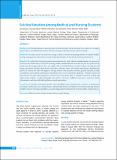Please use this identifier to cite or link to this item:
https://hdl.handle.net/20.500.14356/2290| Title: | Suicidal Ideation Among Medical and Nursing Students |
| Authors: | Atreya, Alok Nepal, Samata Menezes, Ritesh G Marhatta, Anu Ghimire, Sristi Shah, Palak |
| Citation: | AtreyaA., NepalS., MenezesR. G., MarhattaA., GhimireS., & ShahP. (2023). Suicidal Ideation Among Medical and Nursing Students. Journal of Nepal Health Research Council, 20(4), 852-858. https://doi.org/10.33314/jnhrc.v20i4.4147 |
| Issue Date: | 2022 |
| Publisher: | Government of Nepal; Nepal Health Research Council; Ramshah Path, Kathmandu, Nepal |
| Keywords: | Medical students Nepal Nursing students Suicidal ideation |
| Series/Report no.: | Oct-Dec, 2022;4147 |
| Abstract: | Abstract Background: Suicidal ideation is a major predictor of suicide attempts. The present study was conducted to compare the prevalence of suicidal ideation and its risk factors among medical and nursing students in Nepal. Methods: An online survey was carried out among a cohort of medical and nursing students of Lumbini Medical College using questions derived from General Health Questionnaire-28 and Patient Health Questionnaire-9. Results:153 medical and 148 nursing students participated in the study. Lifetime suicidal ideation was present in 20.6%(n=62) medical and 13.95%(n=42) nursing students. Suicidal ideation in the last one year was present in 48 medical and 36 nursing students. There were higher odds of suicidal ideation in medical students who had parental neglect, psychiatric disorder, physical and sexual abuse, substance abuse, and academic performance dissatisfaction (p<0.05), whereas the odds were higher in nursing students with psychiatric disorder, parental demands, alcohol consumption, and academic performance dissatisfaction but was not statistically significant. Thematic analysis of the responses for open-ended question for reasons for previous suicide plans or attempts among four medical and eight nursing students revealed relationship issues, history of adverse childhood experiences, academics-related circumstances, and other individual problems as suicide antecedents. Conclusions: Periodic motivational speeches and counselling sessions during all the semesters of professional schooling would help decrease suicidal ideation. Mental health awareness programs for medical and nursing students should be aimed at reducing mental illness-associated stigma and promoting timely professional help-seeking behavior. Keywords: Medical students; Nepal; nursing students; suicidal ideation |
| Description: | Original Article |
| URI: | https://hdl.handle.net/20.500.14356/2290 |
| ISSN: | Print ISSN: 1727-5482; Online ISSN: 1999-6217 |
| Appears in Collections: | Vol 20 No 04 Issue 57 Oct-Dec, 2022 |
Files in This Item:
| File | Description | Size | Format | |
|---|---|---|---|---|
| 4147-Manuscript-32161-1-10-20230720.pdf | Fulltext. | 229.48 kB | Adobe PDF |  View/Open |
Items in DSpace are protected by copyright, with all rights reserved, unless otherwise indicated.
